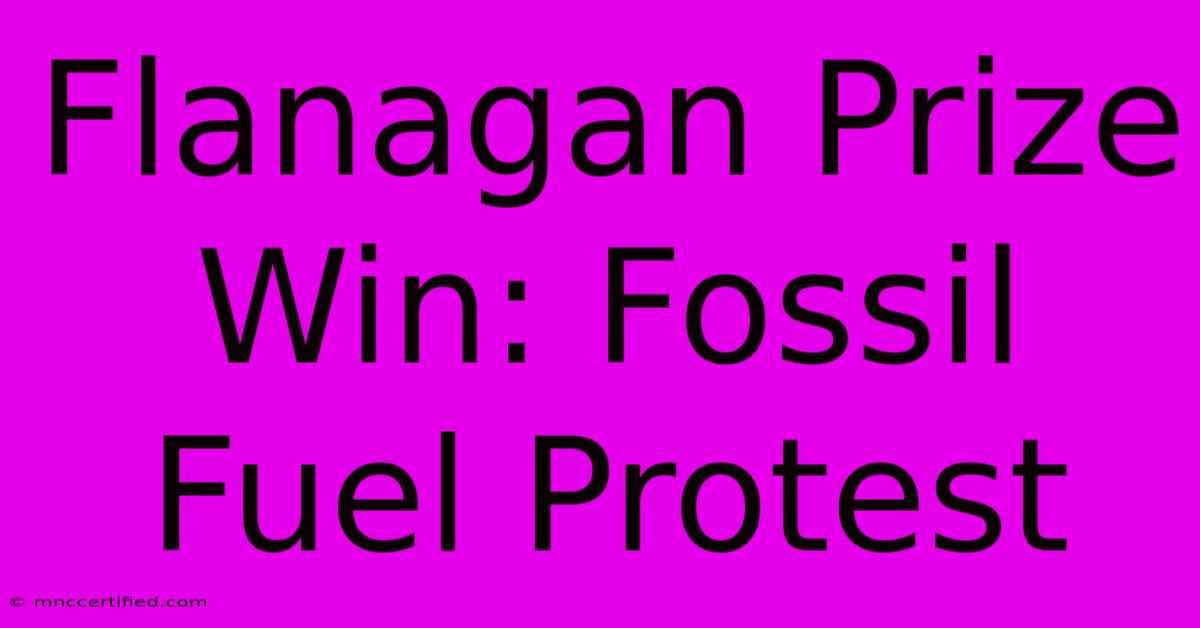Flanagan Prize Win: Fossil Fuel Protest

Table of Contents
Flanagan Prize Win: Fossil Fuel Protest Shakes Up Literary Landscape
The 2024 Flanagan Prize, a prestigious award recognizing outstanding achievement in fiction, has sparked significant controversy following the win of Burning Ember, a novel explicitly centered on climate activism and the disruption of fossil fuel infrastructure. This victory isn't just a literary event; it's a powerful statement about the growing influence of climate change narratives in mainstream culture and the increasingly urgent demand for environmental justice.
Beyond the Prose: A Novel's Political Impact
Burning Ember, penned by debut author Anya Sharma, depicts a fictionalized account of a daring protest targeting a major oil pipeline. The novel isn't simply a recounting of events; it delves deep into the motivations of the activists, exploring their ethical dilemmas, personal sacrifices, and the complex web of political and economic forces at play. This unflinching portrayal has garnered both enthusiastic praise and fierce criticism.
The Acclaim and the Backlash
Sharma's win has been lauded by many environmental groups and climate activists who see it as a much-needed spotlight on the climate crisis. The novel's visceral depiction of the consequences of fossil fuel reliance has resonated with readers, sparking important conversations about ecological responsibility and corporate accountability. Keywords: Flanagan Prize, Anya Sharma, Burning Ember, climate activism, fossil fuel, environmental justice, ecological responsibility, corporate accountability.
However, the choice has also faced significant backlash. Some critics argue that the novel's overtly political stance compromises its artistic merit, claiming that it prioritizes activism over literary excellence. Others have accused Sharma of promoting dangerous and illegal activities. This controversy underscores the ongoing debate surrounding the role of art in political discourse. Keywords: literary criticism, political art, artistic merit, controversy, debate.
The Flanagan Prize and its evolving role
The Flanagan Prize, known for its eclectic selection of winning novels, has always reflected the changing cultural landscape. This year's choice, however, represents a significant shift. The selection of Burning Ember suggests a growing awareness within the literary establishment of the urgency of climate change and its impact on all aspects of society. This could signal a broader trend towards incorporating climate narratives into mainstream literature, fostering a greater sense of urgency and prompting crucial discussions surrounding our environmental future. Keywords: Flanagan Prize winners, literary trends, climate change narratives, mainstream literature.
Beyond the Page: The Ripple Effect
The controversy surrounding Burning Ember's win extends beyond the literary world. The intense public debate triggered by the award highlights the increasingly politicized nature of art and the power of literature to shape public opinion. The novel's success could inspire more writers to tackle climate change themes head-on, leading to a surge in environmentally conscious narratives. Furthermore, the intense public discussion it has generated could encourage greater engagement with climate-related issues, driving positive changes towards a more sustainable future. Keywords: public opinion, social impact, sustainable future, climate change solutions.
Looking Ahead: The Future of Climate Fiction
Burning Ember's win signals a potential turning point for climate fiction. The novel's success demonstrates the growing public appetite for stories that address climate change directly and honestly, moving beyond abstract discussions to visceral narratives that deeply engage readers. This suggests a future where climate fiction isn't a niche genre, but a significant and impactful force in shaping public understanding and driving meaningful action. Keywords: climate fiction, environmental literature, future of literature, public engagement, meaningful action.
Conclusion: The Flanagan Prize win for Burning Ember is more than just a literary award; it’s a cultural moment. The intense debate sparked by its selection underscores the growing influence of climate narratives in contemporary literature and highlights the power of art to shape public discourse and inspire action on pressing social and environmental issues. The novel's success promises to invigorate the climate fiction genre and push the boundaries of what stories can achieve.

Thank you for visiting our website wich cover about Flanagan Prize Win: Fossil Fuel Protest. We hope the information provided has been useful to you. Feel free to contact us if you have any questions or need further assistance. See you next time and dont miss to bookmark.
Featured Posts
-
Custom Trading Card Game Playmats
Nov 20, 2024
-
Michael Wagner Fisher Investments
Nov 20, 2024
-
Failed Investments Crossword Clue
Nov 20, 2024
-
Investment Property Loans Florida
Nov 20, 2024
-
Investment Properties San Antonio
Nov 20, 2024